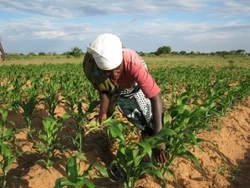
Guardian on Sunday | 3rd July 2011
By Henry Muhanika
An article on a big US-based agri-business company which intends to invest heavily in Tanzania has appeared in some US newspapers, and picked by one of the English weeklies.
The news has been received with mixed feelings by some agricultural experts and citizens who happen to follow developments in the land of apparent peace keenly.
According to this article, which the local newspaper gave a screaming headline of ‘US investor set to acquire large chunks of land in Tanzania’, the intention of the investor is to bring modern and sustainable agriculture to the country, so that even small holder farmers can learn techniques of the 21st century farming.
The size of the ‘chunk’ of the land involved in the conceived project is not all that small, and can be mind-boggling to residents of small African countries like Rwanda, Burundi, Lesotho, Togo etc. , where shortage of land is already a source of worry and conflicts in society. The land earmarked for the massive grain and livestock operation is not less than 800,000 hectares.
If things go as planned, the company will secure a 99-year lease of the extensive area “for the purpose of growing crops to be sold in the country, the rest of East Africa and other neighbour countries”.
Those behind the deal maintain that smallholder farmers stand to benefit from this project, which is apparently determined to demonstrate that the two categories of farmers, that is small-scale producers and agricultural giants, can co-exist mutually.
The sugar-coated project write-up reveals that the benefits which smallholder farmers around the mechanized farming operation are likely to enjoy include availability of modern seeds and fertilizers to them at reasonable prices, and even on loan where necessary, a new market for their crops, and jobs. In fact promoters say the project’s outreach programme to assist smallholder farmers will enable them to improve production per hectare 5 to 10 times.
Coming at a time when the UN Food and Agriculture Organization (FAO) has just released a report which reveals that climatic changes affecting the environment are likely to impact negatively on agriculture in Africa, and put most countries at the risk of starvation, the project under discussion becomes quite appealing.
Apart from the FAO report, a few days ago the State Minister in the Vice President’s Office responsible for Environment, Dr Terezya Luoga, sounded a warning while officiating during the commemoration of the World Desert Day, that hunger is looming in 9 regions of Tanzania which have been hit by severe drought for many months. This again strengthens the argument of supporters of foreign commercial famers that we need the latter for survival and economic development.
So Far so good. But there is another side of the proverbial coin to this development. Some of the experts and international NGOs specializing in Third World development trends are already sounding an alarm about land grabbing in some countries by foreigners, who take advantage of poverty and corruption in targeted regions to effect their mission.
Reports published by development-oriented international NGOs like the UK-based OXFAM, do inform us that some food deficit countries, including Arab ones, which were financially strong before the ongoing political tsunami engulfed them, have been busy acquiring vast areas of land in several countries south of the Sahara, mainly to grow food for their own population at home.
Yes, part of the land acquired is used to grow biofuels, a move which gives first priority to fuel at the expense of food production in a hungry continent! Some countries sub-lease part of the massive land to partners under arrangements which do not benefit the host country. To what extent are we prepared to strike deals with such investors which will lead to a win-win situation to both parties?
And the most disturbing question here is: who should have powers to give 800,000 hectares to a foreigner under a 99-year lease arrangement, and under what procedures?
Some say unless a new constitution to address such issues pertaining to allocation of our national resources is put in place urgently, we may end up closing the stable after the proverbial horse has escaped - that is, after the country has been literally sold.
Henry Muhanika is a Media Consultant, [email protected]













